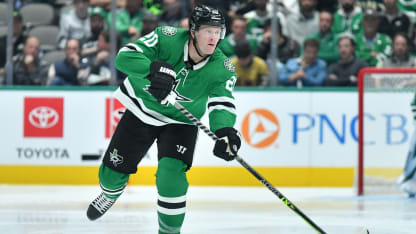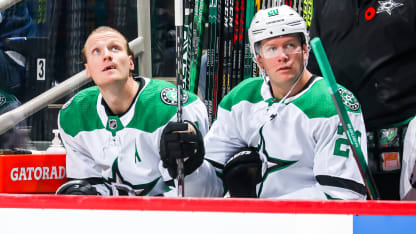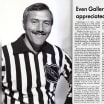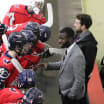There was a balance Joe Pavelski needed to strike. He wanted to be persuasive, but not annoying. Friendly, but not overbearing. He settled on texting Ryan Suter every other day, making his case bit by bit that Suter should join his old friend on the Dallas Stars.
Suter to face Wild with Stars for first time since contract buyout
Joined friend Pavelski in Dallas after getting over 'shock' of Minnesota decision

© Glenn James/Getty Images
It was a time that could have been fraught for Suter. His former team, the Minnesota Wild, had ended a nine-year relationship with an out-of-the-blue telephone call on July 13, the news delivered as Suter was driving to a practice rink that was suddenly not his own.
Instead, Suter felt love and appreciation, a sense that he was not just wanted, but coveted, around the NHL.
Pavelski wanted to make sure that Suter didn't just feel the love from Dallas, that it convinced him to come aboard with the Stars.
He texted every other day. He mentioned that other teammates had texted him about Suter. He used their relationship, which dates to running in the same hockey circles as youth players in Wisconsin. He dropped the idea that their oldest sons, each 11, could play hockey together.
"That was an angle you could use, as far as youth hockey and get them on the same team," Pavelski said, noting that on an off day in Boston this season that he and Suter were able to drive to see their kids play in a tournament nearby.
In the end, Suter chose Dallas, signing a four-year contract with an average annual value of $3.65 million on the first day of NHL free agency, July 28. It was 15 days after the Wild bought out the contracts of Suter and Zach Parise on the same day.
Suter will face the Wild for the first time as a member of the Stars when they play at Xcel Energy Center in St. Paul on Thursday (8 p.m. ET; BSN, BSWI+, BSSW, ESPN+, NHL LIVE).
"You're in shock," the 36-year-old said when he found out the Wild were buying out his contract. "You don't know what just happened, what to say. There had been nothing up to this point hinting that this was going to happen. So caught me off guard."
It was a stunning end of the relationship with the Wild for Suter and Parise, who each signed matching 13-year contracts on July 4, 2012.
Parise returned to Minnesota on Nov. 7 with his new team, the New York Islanders and lost 5-2. Now it is Suter's turn.

© Jonathan Kozub/Getty Images
The union between Suter and the Stars is a match that many believe will work out well. The Stars have a mobile defense headlined by Miro Heiskanen, 22, John Klingberg, 29, and Esa Lindell, 27, and Suter can be that veteran stabilizing force, like he was so often in Minnesota.
"I think he's going to do a good job for Dallas," said Bruce Boudreau, who coached Suter on the Wild from 2016 to 2020. "He's going to bring some leadership to those great young defensemen in the back end. I think he's going to be the settling influence on that team that's going to make them a pretty good team. I thought it was a great [signing]."
But to get there, the Wild and Suter had to part.
For Suter, the buyout came out of the blue. It marked the first time all season that he had talked to owner Craig Leipold, and it sent his head spinning.
He quickly rebounded, preparing himself for the next chapter, which came with Dallas a little more than two weeks later.
The Stars (6-6-2) have underperformed this season, but expectations remain high. Suter is doing his part, scoring eight points (two goals, six assists) in 14 games, second to Heiskanen (13 points) on Dallas. He is also averaging 22:50 of ice time per game, also second to Heiskanen (24:54).
The Stars reached the Stanley Cup Final in 2019-20, losing to the Tampa Bay Lightning in six games, but missed the playoffs last season. They think they have the right blend of veterans and young players to be competitive through at least the four years of Suter's contract.
"Any time a player of his pedigree becomes available, you have to look at it," general manager Jim Nill said. "So I called his agent right away. Said, 'what's the circumstances?' We just thought he'd be the perfect fit for us. He's got a great pedigree. His resume speaks for itself. And those players don't come available very often.
"He wants to win. He's coming to win. That's the bottom line."
Suter said 15 or 16 teams expressed interest, but Dallas felt right.
Of course, Minnesota felt that way too.
When Suter and Parise signed those matching contracts, the idea was that they would come to the Wild and the Wild would win. It was a franchise-altering day. But even though the Wild would make the Stanley Cup Playoffs in eight of the next nine seasons, they got to the second round only twice, in 2013-14 and 2014-15, losing to the Chicago Blackhawks each time.
"I think when they got him and Zach, they thought this was the piece to the puzzle that we're going to win the Cup," Boudreau said. "When I read that they had first signed -- I was in Anaheim at the time -- I thought, uh oh, Minnesota is going to be unbelievable. It never came to fruition, that the team became overly great."
They had signed to bring change and success and the Cup to Minnesota. They left unfulfilled.
"You get to that point and you realize that's not what you should be expecting," Wild defenseman Jared Spurgeon said. "You want to get to the end and want to be at the top. … We never got to that point where we wanted to, and that's still something we're chasing after today."
Suter, who was an alternate captain throughout his tenure with the Wild, was able to act as a mentor to the young defensemen, helping them on the ice, helping them off the ice, something that he's being counted on to do in Dallas as well. Spurgeon, now 31, was 21 when he made his debut with the Wild.
"He taught me a lot, just from the first year coming in, just the little things that he would teach you on the ice and also just the way to handle yourself in certain situations, just the highs and lows of the season," said Spurgeon, who was named the Wild captain in 2020. "Just to pick his brain and be able to ask questions and have an answer coming back from a guy like that is always good for a good young defenseman."
If a defenseman wasn't quite right, Boudreau would pair him with Suter, as he would do with a forward in Washington with Capitals center Nicklas Backstrom. It was a way of resetting players. It usually worked.
"There's not a lot of players on every team that you can throw out there and you feel comfortable when they're on the ice that you know something good's going to happen," Boudreau said.
With Suter, usually, it did.

© Glenn James/Getty Images
That's what the Stars are counting on. It's why they gave him so much term at an age when most defensemen are near the end.
Suter is not willing to say that this will be his final contract. Even though he will be 40 when it expires, he is leaving his future open-ended.
As he put it, "I know I can play at least four years. I'm hoping to play longer."
He invokes Chris Chelios, a defenseman who played in the NHL until he was 48, as a model for his ambitions.
Not that that his age wasn't a worry for the Stars.
"It's always a concern," Nill said. "We know that the clock's ticking, but a player like him, that's where we did our research. I've seen him play for a long time -- he reminds me of Chris Chelios. He's an easy skater, so it's not like his skating is dropping off. … He looks after himself. Got great hockey sense. Those guys, they just age well."
In joining Pavelski in Dallas, Suter found a player in the same situation, though the three-year contract Pavelski signed July 1, 2019 with the Stars is set to expire at the end of this season. Each is in his late 30s -- Pavelski is 37 - and neither has won the Cup. They are hoping that the Stars have the mix needed to get them there.
Which was why Pavelski sent all those texts during the offseason.
"We both haven't won yet," Suter said. "I know there's a lot of guys in that room that live each day to have the chance to win. I'm excited to be a part of that."

















